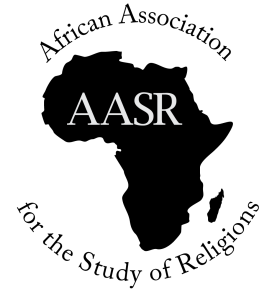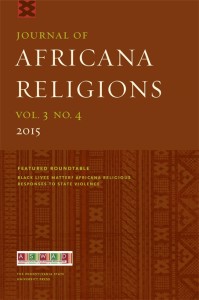2023
Journal for the Study of the Religions of Africa and its Diaspora – Issue 6.1 (November 2023)
On behalf of Afe Adogame, the Editor-in-Chief of the Journal for the Study of the Religions of Africa and its Diaspora, an AASR e-Journal, we announce the publication of Issue 6.1 (November 2023). This is a Special Issue, which has been guest edited by Lovemore Togarasei and Rebecca Kubanji, with the theme “Religious Beliefs, Health Seeking and Health Provision Behaviours in Botswana”. The issue contains an Introduction and 8 original articles related to this theme.
The issue can be viewed and downloaded directly via this page. This and previous issues can be accessed via the journal page on the AASR website.
Corey Williams
2020
AASR President, Elias Bongmba, is new the Executive Editor of The Journal of Religion in Africa.
The Journal of Religion in Africa invites you to consider serving as a reviewer of manuscripts that have been submitted to the journal. The peer review process remains the core of our intellectual practice and we would greatly appreciate it you take the time to review submissions. If you are interested in occasionally reviewing submissions, send a message to Elias Bongmba, Executive Editor bongmba@rice.edu or to Diana Bell at bell.dianna@gmail.com.
2019
IAHR e-Bulletin Supplement Feb 2019
2018
Announcing a Partnership with the Journal of Africana Religions!
A letter from our President, Elias K. Bongmba, outlining an exciting new initiative with the Journal of Africana Religions, followed by our joint press release. Read on!
Dear Colleagues of the AASR Community,
The executive of AASR has received, discussed, and approved an invitation from Professor Sylvester Johnson and Professor Edward Curtis, editors of the Journal of African Religions, for the African Association for the Study of Religions to collaborate closely with the Journal of Africana Religions. This is a new chapter for us, but also similar to the ties we have with the Journal of Religion in Africa.The journal also edits a book series in Africana Religions and recent authors who have published in the series include Oludamini Ogunnaike and Adriaan van Klinken. Please do take some time and look at the description of the series here.
We are delighted to tell you that as part of this collaboration, the editors of the journal have informed us that AASR members based in Africa will receive free subscriptions to the journal. Our members who live outside Africa will receive discounted subscription to the journal.
We invite all our members to be part of this expanded intellectual collaboration because it further fulfills one of our goals of strengthening our growing intellectual community in Africa and the African diaspora.
Sincerely,
Elias K. Bongmba
President, AASR
# # # # # FOR IMMEDIATE RELEASE # # # # #
CONTACT:
Sara Fretheim, sara@sarafretheim.com
Edward Curtis, ecurtis4@iupui.edu
RELEASE DATE: November 29, 2018
AFRICAN ASSOCIATION FOR THE STUDY OF RELIGIONS AND JOURNAL OF AFRICANA RELIGIONS ANNOUNCE GROUNDBREAKING PARTNERSHIP
Today the African Association for the Study of the Religions (AASR) and the Journal of Africana Religions announced a multifaceted partnership that will advance the global study of Africana religions.
“This is a new chapter for us,” said AASR President Elias Bongmba, who is the Harry and Hazel Chavanne Chair in Christian Theology at Rice University. “It significantly strengthens our growing intellectual community in Africa and the African diaspora.”
The new partnership’s most ambitious component is the creation of pan-Atlantic research teams that will unite scholars from Africa, the Americas, and Europe for collaborative research and writing. “In some cases,” according to Journal of Africana Religions co-founder and Virginia Tech Humanities Center Director Sylvester Johnson, “these will be mentoring relationships between senior and junior scholars. In other cases, the pairs will be composed of professors of equal rank. Whatever the case, the pairings must be mutually beneficial.”
“If these research pairings work the way we want them to,” added journal co-founder and IUPUI Millennium Chair of the Liberal Arts Edward Curtis, “some of them will lead to joint authorship of book manuscripts that we will want to consider for publication.” In addition to editing the journal, Johnson and Curtis are the editors of a Penn State University Press book series on Africana religions.
Under the new partnership agreement, AASR will become a Journal of Africana Religions sponsor, and AASR members working in Africa will receive complimentary e-subscriptions to the journal.
The Journal of Africana Religions will also play a role at the 9th AASR conference in Dakar, Senegal, in 2020.
Both groups plan on supporting one another’s social media and communications strategies, too.
Founded in 1992 in Harare, Zimbabwe, the AASR promotes the study of religions in Africa through international collaboration in research, publishing, and teaching. AASR is an affiliate organization of the International Association for the History of Religions. It provides a scholarly network for scholars across the African continent, Europe, and North America through its conferences in Africa, its bulletin, its own e-journal on African and African diasporic religions, and annual meetings at the American Academy of Religion and African Studies Association. It also supports the Journal of Religion in Africa.
The Journal of Africana Religions is a peer-reviewed journal that features research on the diverse religious heritage of African and African-descended people. Now in its seventh volume, the journal, which is published by Penn State University Press, is available from Project Muse and JSTOR as well as in print. It is also sponsored by the Association for the Study of the Worldwide African Diaspora (ASWAD).
Both organizations emphasized that their new cooperation will complement rather than compete with existing partnerships and initiatives. The purpose is to increase resources devoted to the growth of the field in order to reflect its critical importance to the future of human knowledge-making.
# # # # # # # # # # #



